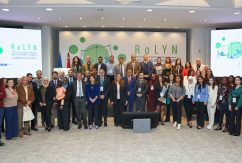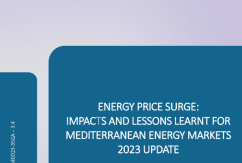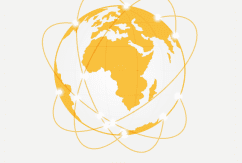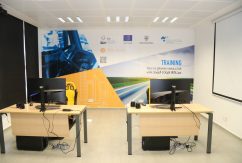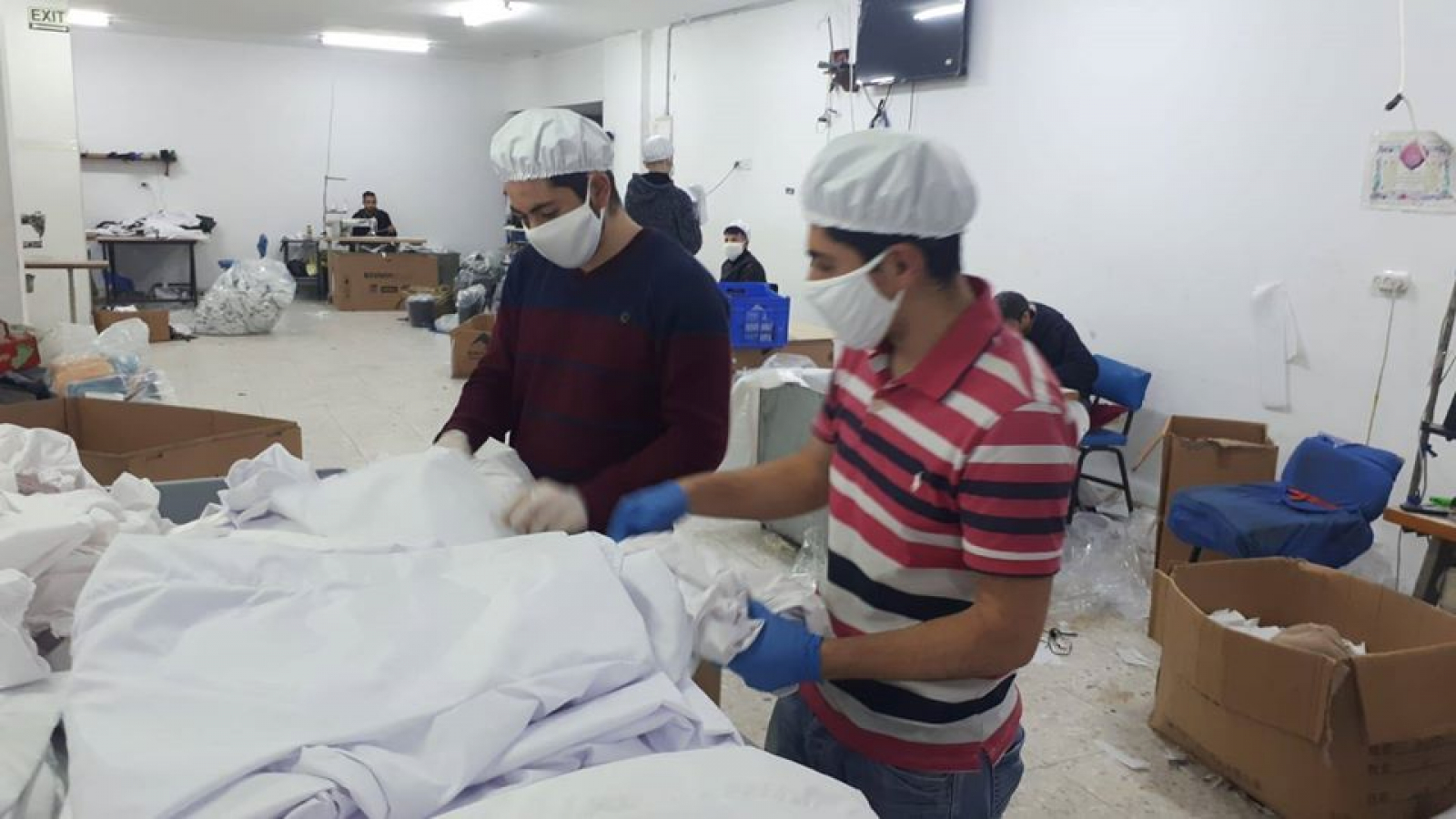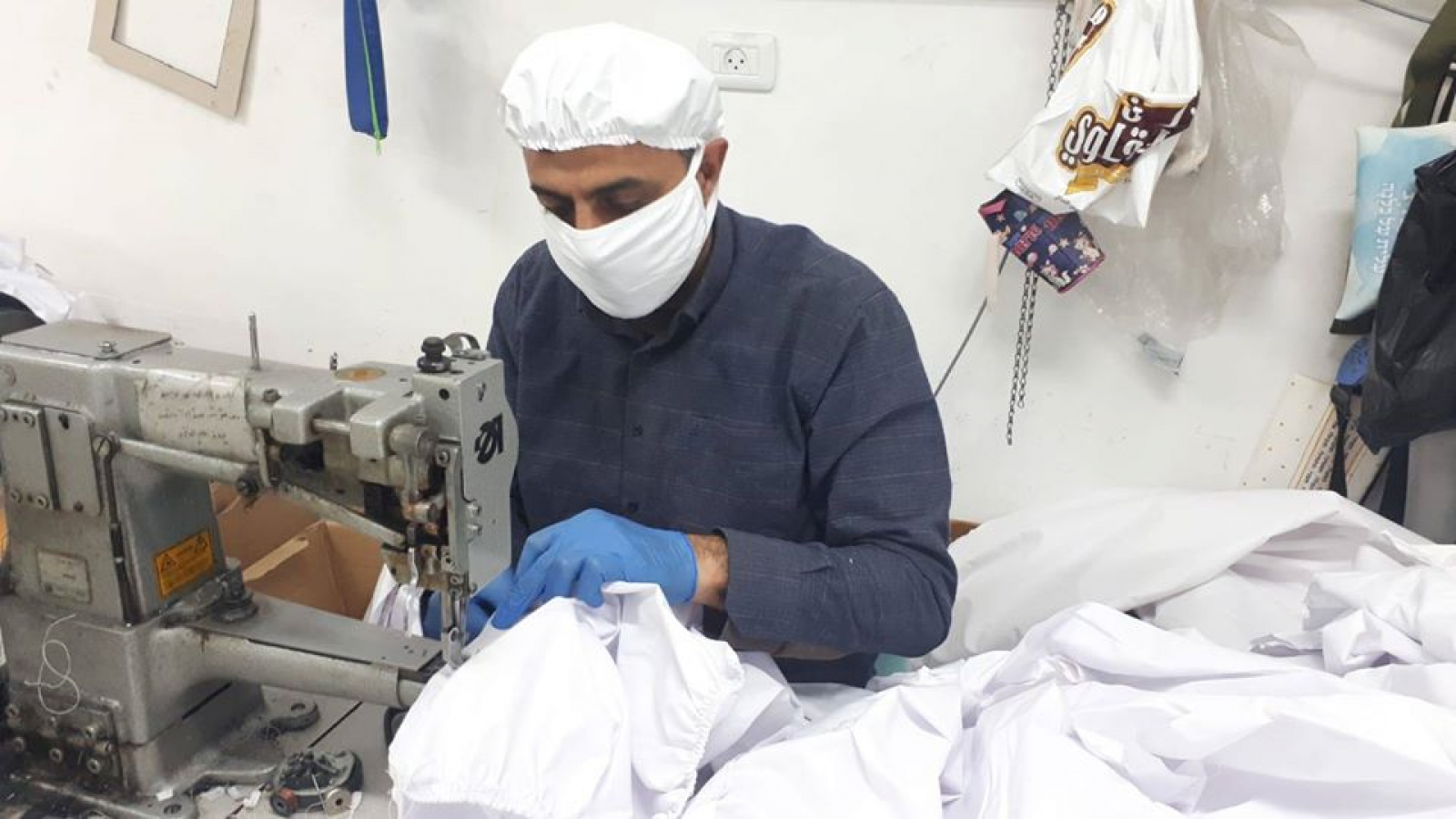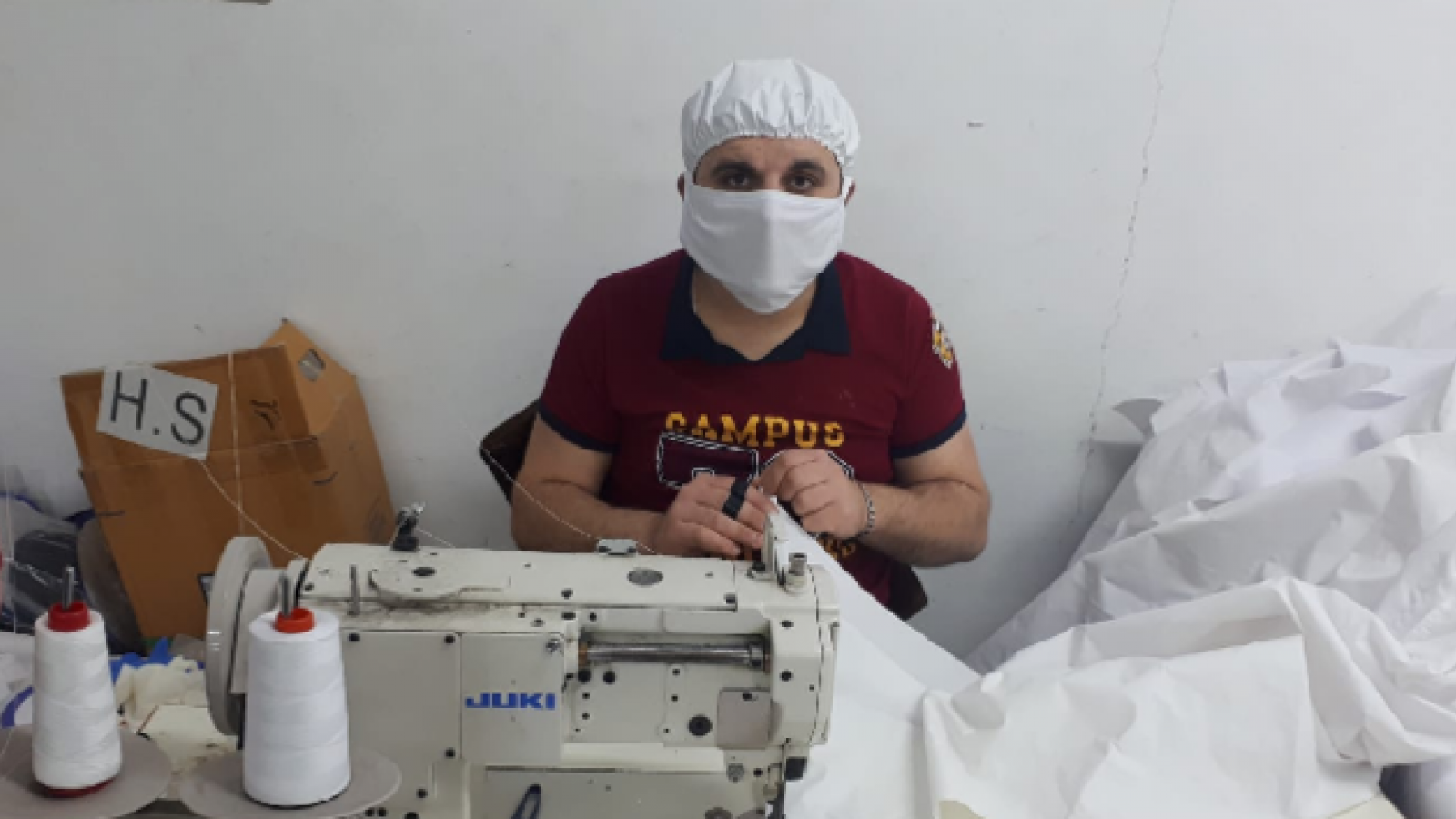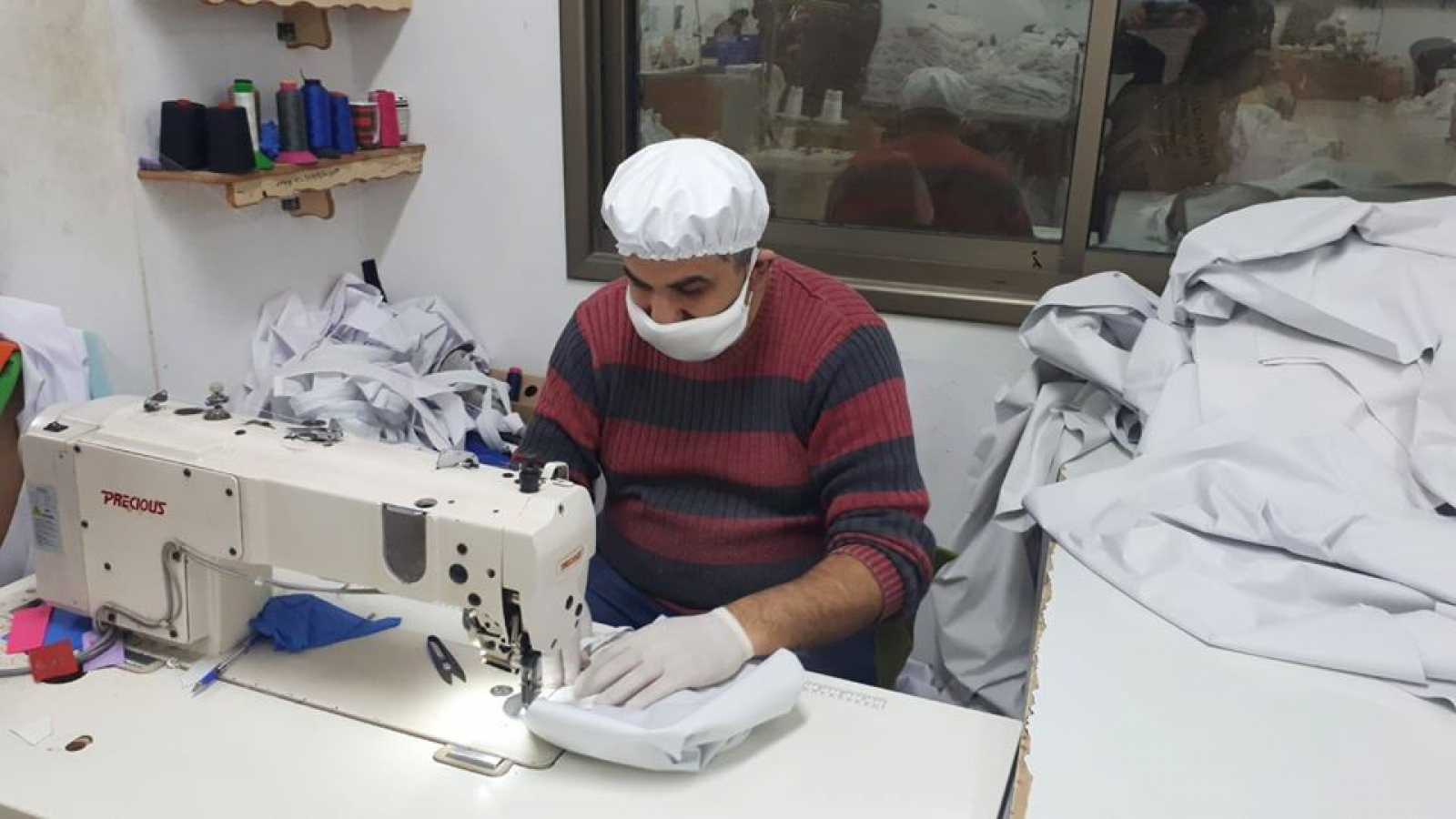Zoom bags: From school bags to protective clothing to combat the coronavirus
The Zoom Bags factory has switched to manufacturing protective gear for use in the war against the coronavirus pandemic at a time when most factories are closed, using the European Bank for Reconstruction and Development’s scheme called the “Small Business Advisory Services” programme, funded by the European Union.
At a time when all facilities in Palestine were closed after the Palestinian government declared a state of emergency on 5 March to combat the outbreak of the coronavirus (Covid-19) pandemic, and at a time when the Palestinian territories faced a shortage of the medical supplies required to protect against the virus such as masks, gloves and protective clothing, it turned to the Zoom Bags factory, located in Nablus in the northern West Bank, to manufacture protective clothing for use in the war against the virus, which has been of great help in helping Palestine cope with the pandemic. The protective clothing in question is the gear worn by health-care crews working with people suffering from the virus, as well as security teams and volunteers working to enforce public safety and movement restrictions as well as factory workers and others.
The management of the Zoom factory, a small-scale manufacturer of school bags and soft toys for children, attributes its ability to switch away from that industry, which has completely stopped production during the emergency, to the multi-functional protective clothing industry, demand for which has increased to an unprecedented degree in the past three months. This has all been thanks to the advice it has obtained and the skills it has gained from the European Bank for Reconstruction and Development’s scheme called the “Small Business Advisory Services” programme, funded by the European Union.
“The idea of designing and producing a multi-functional protective gown came while we were watching on our TV screens crews dealing with the coronavirus who were wearing a white protective gown in all parts of the world except in Palestine,” says Youssef Sokhon, one of the people close to the Zoom factory management, who spoke to us on their behalf. “We found out that the reason for the scarcity of that gear in our country is because it had not been previously ordered. However, we also knew that the fabric already in our possession has the specifications required to manufacture protective gear of that type in terms of its resistance to bacteria and microbes, its impermeability to liquids and its resistance to fire and flame.”
“We manufactured a sample of a protective gown and showed it to the doctors, but they did not believe it had been locally-made because of its high quality,” he added. “That encouraged us to continue with the procedures required to market it, such as obtaining a certificate of approval from the Palestinian Specifications Authority so that we could be included on the list of companies approved to supply the Palestinian market with that type of gown.” He went to say, “we did all of this within five days, and we resumed work with a new working model, taking into account social distancing procedures and other regulations to limit the spread of the virus.”
Now, the Zoom factory has received thousands of orders, and has been able to cover all the requirements of the Palestinian market for these gowns in record time. “We have been able to sell about ten thousand items during the past two months to the health sector, health centres, the security forces and the emergency committees in the governorates.”
The EBRD’s “Small Business Advisory Services” programme
The “Small Business Advisory Services” programme was launched in the West Bank in July 2018 with funding from the European Union and was implemented by the European Bank for Reconstruction and Development (EBRD).
The programme aims to assist the private sector to increase production and employment by helping small and micro businesses grow by providing business advice to them by local and international consultants. To achieve this goal, the programme works to expand the capacity of local consultants to provide advice to commercial concerns on the one hand, and to support those concerns as they implement the recommendations of advisors and adapt to the use of best practices in various fields on the other hand.
In the West Bank, the programme has supported 43 projects in various sectors, including the food and beverage industry, the construction industry, the stone and marble industry and the chemical and pharmaceutical industries.
Local consulting firms
One of the local consulting firms that has benefitted from the European Bank for Reconstruction and Development’s scheme under the “Small Business Advisory Services” programme is Spark Consulting in Nablus. Founded in 2010, Spark works in the areas of institutional development, market research and information technology. The EBRD started up a partnership with Spark Consulting to help small business interests in the West Bank benefit from the “Small Business Advisory Services” programme in early 2019. During the first year of that partnership, the company worked with five commercial concerns in the West Bank to develop them; the company has completed work with three of them and is still working with two.
To enable Spark to provide the greatest assistance to the targeted businesses, the “Small Business Advisory Services” programme has enhanced the company’s practical experience through systematic training carried out by the EBRD working with experts from the company. In this regard, Mr Muhannad Hijawi, the General Manager of the Spark company, points out that during the recent period, four experts from the company have received training in related fields such as business continuity and e-commerce, and he added: “The training courses of the EBRD did not stop even at the height of the coronavirus pandemic and during April we received two training sessions via the Zoom app and we are set to receive additional training sessions during this month of May.”
Dina Conquer, director of the “Small Business Advisory Services” programme, adds that the EBRD offers local consulting firms a series of training courses entitled “Grow your consulting business” dealing with topics of importance to both consulting firms and commercial interests, including strategy, marketing and quality management, IT and computing.
A story of perseverance and growth
The Zoom Bag factory in Nablus was one of the commercial concerns that Spark gave advice to. Mr Hijawi explains that the reason for choosing that factory as one of the beneficiaries of the programme was that the factory-owners already possessed a high level of craftsmanship in the field of sewing and bag-making, but they did not possess business management skills, which impeded their growth and held them back among the ranks of small workshops.
“And so we worked with the Zoom Factory to develop the company’s administrative system. We started by analysing the factory’s administrative system, then we developed operational procedures for all the administrative and technical processes inside the factory such as cost calculation, how to calculate the quantities of raw materials, and how to control the quality of the final product,” he added. He continued, “Administrative matters have become easier and simpler when applying these procedures.”
Ms Conquer adds: “The programme team visited the factory, assessed its needs, helped in setting priorities and the scope of work, and worked to ensure that the consultative interventions were within the scope of what was required. The purpose of the intervention was to ensure high-quality management standards in order to obtain the international quality certification ISO 9001 so as to improve quality and allow the factory to export, and this is what the factory is now ready to achieve.”
All of these interventions have brought the Zoom factory up to a quality standard that has helped it in its switch to producing multi-use protective gowns to cover the requirements of the Palestinian market at a time when it was most needed. The factory was not just satisfied with that, but has also received orders to supply gowns to Israel and is considering exporting them abroad, as well as having orders to supply 100,000 single-use gowns to Israel as well. Mr Sokhon ended on an enthusiastic note: “These orders have not simply enabled us to keep the doors of our factory open for just thirty workers, but have also enabled us to employ fifteen small-scale sewing operators in the city of Nablus and the surrounding villages with about four to five workers at each operator cutting fabric and sewing it, and so we have succeeded in preventing at least a hundred families working in the sewing sector from falling into the quagmire of indigence and poverty during this pandemic.”
The Zoom factory has grown remarkably and in record time at a time when most industries have closed down. This is because of the skills possessed by the owners of the factory and its employees and the measures taken at the factory in line with the advice they obtained from the European Bank for Reconstruction and Development’s “Small Business Advisory Services” programme funded by the European Union.


